

15 Famous Muslim (Arab & Persian) Scientists and their Inventions. Muslim scientists and inventors, including Arabs, Persians and Turks, were probably hundreds of years ahead of their counterparts in the European Middle Ages.

They drew influence from Aristotelian philosophy and Neo-platonists, as well as Euclid, Archimedes, Ptolemy and others. The muslims made innumerable discoveries and wrote countless books about medicine, surgery, physics, chemistry, philosophy, astrology, geometry and various other fields. Today’s article discusses the most famous muslim scientists and inventors and their wonderful inventions. Abu Nasr Al-Farabi (872 – 950) Also known as Alpharabius.
Al-Battani (858 – 929) Also known as Albatenius. Ibn Sina (980 – 1037) Also known as Avicenna. Ibn Battuta (1304 – 1369) Also known as Shams ad–Din. Ibn Rushd (1126 – 1198) Also known as Averroes. Muhammad ibn Musa Al-Khwarizmi (780 – 850) Also known as Algoritmi or Algaurizin. Omar Khayyam (1048 – 1131) Thabit ibn Qurra (826 – 901) Also known as Thebit. Abu Bakr Al-Razi (865 – 925) Islamic Contributions to Civilization. About the Author STANWOOD COBB was born in Newton, Mass.
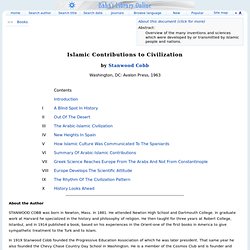
In 1881. He attended Newton High School and Dartmouth College. In graduate work at Harvard he specialized in the history and philosophy of religion. He then taught for three years at Robert College, Istanbul, and in 1914 published a book, based on his experiences in the Orient-one of the first books in America to give sympathetic treatment to the Turk and to Islam.
In 1919 Stanwood Cobb founded the Progressive Education Association of which he was later president. Introduction MY interest in Islam dates from the time I lived in Istanbul, teaching at Robert College. Sharia. To Arabic-speaking people, sharia (shariah, shari'a, sharīʿah; Arabic: شريعة šarīʿah, IPA: [ʃaˈriːʕa], "legislation"),[1] also known as Islāmī qānūn (اسلامی قانون), means the moral code and religious law of a prophetic religion.[2][3] In English usage, the term "sharia" has been largely identified with Islam.[4] Sharia deals with many topics addressed by secular law, including crime, politics, and economics, as well as personal matters such as sexual intercourse, hygiene, diet, prayer, everyday etiquette and fasting.
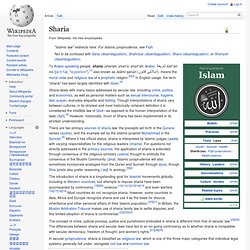
Though interpretations of sharia vary between cultures, in its strictest and most historically coherent definition it is considered the infallible law of God—as opposed to the human interpretation of the laws (fiqh).[5] However, historically, much of Sharia has been implemented in its strictest understanding. Etymology and origins[edit] History[edit] The Five Pillars of Islam. Islamic contributions to Medieval Europe. From the 11th to 13th centuries, medieval Europe absorbed knowledge from Islamic civilization, which was then at its cultural peak.
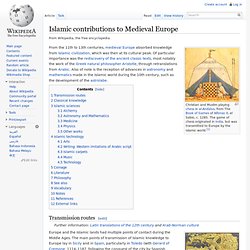
Of particular importance was the rediscovery of the ancient classic texts, most notably the work of the Greek natural philosopher Aristotle, through retranslations from Arabic. Also of note is the reception of advances in astronomy and mathematics made in the Islamic world during the 10th century, such as the development of the astrolabe. Transmission routes[edit] Islamic influences on Western art. Islamic influences on Western art refers to the influence of Islamic art, the artistic production in the Islamic world from the 7th to the 19th century, on Christian art.
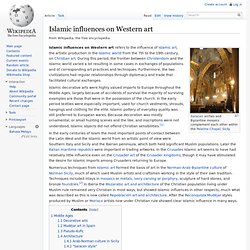
During this period, the frontier between Christendom and the Islamic world varied a lot resulting in some cases in exchanges of populations and of corresponding art practices and techniques. Furthermore, the two civilizations had regular relationships through diplomacy and trade that facilitated cultural exchanges. Islamic decorative arts were highly valued imports to Europe throughout the Middle Ages; largely because of accidents of survival the majority of surviving examples are those that were in the possession of the church. In the early period textiles were especially important, used for church vestments, shrouds, hangings and clothing for the elite.
Islamic pottery of everyday quality was still preferred to European wares. Islamic Empire influence the development of world history? Islamic Contributions – Islamic Center of Topeka. With Allah’s name The Merciful Benefactor, The Merciful Redeemer.
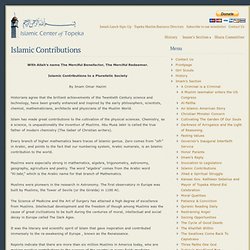
Islamic Contributions to a Pluralistic Society By Imam Omar Hazim.